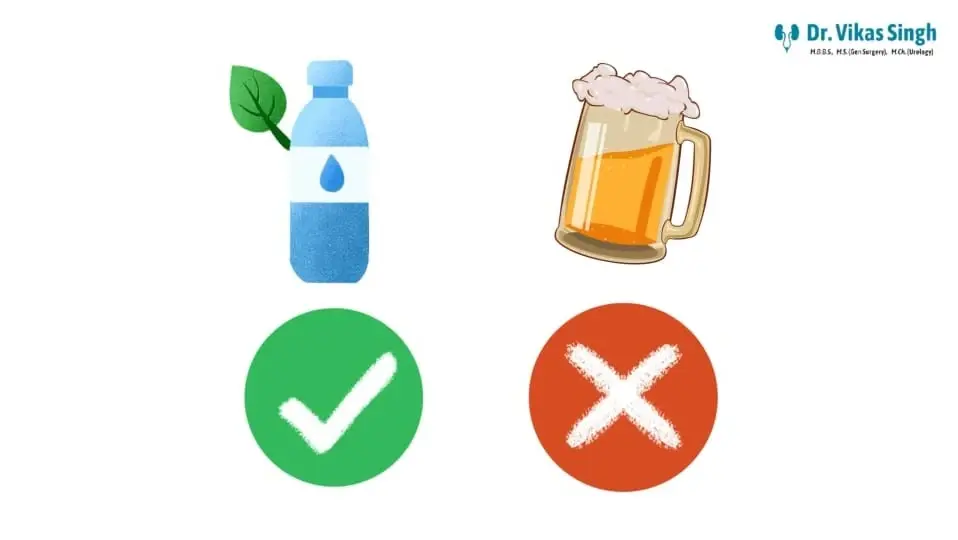Stop Believing These 7 Dangerous Myths About Kidney Stones (Insights from Top Urologist)
- vikas singh
- Nov 17, 2025
- 4 min read
Kidney stones are a painfully common issue, yet a lot of the advice floating around is outdated, scientifically unproven, or even dangerous. Dr. Vikas Singh, a renowned Urologist, addresses the seven most persistent myths that could be putting your kidney health at risk.
Introduction: The Importance of Kidney Stone Awareness
Why Misinformation About Stones is Dangerous
When dealing with a painful condition like kidney stones, the urge to find a quick fix is natural. However, relying on myths can lead to delayed treatment, complications, and potentially serious kidney damage. It’s crucial to separate fact from fiction to ensure you protect one of your body’s most vital filtering organs.
Myth vs. Reality: Debunking 7 Common Misconceptions

Myth 1: Only Large Kidney Stones Cause Pain

This is one of the most widespread and potentially misleading myths.
The Reality: The pain from a kidney stone isn't necessarily related to its size, but to its location. A small stone is often more dangerous because it can easily travel and get stuck in the ureter (the tube connecting the kidney to the bladder). This causes a complete obstruction, leading to pressure, swelling, infection, and the intense pain known as renal colic. Larger stones, while damaging, often sit quietly in the kidney without causing severe acute pain.
Myth 3: You Must Cut Calcium from Your Diet to Prevent Stones

For years, patients were advised to avoid calcium, given that most stones are calcium-based.
The Reality: Dietary calcium is essential and should not be restricted. When you consume calcium in your food, it binds to oxalates (another stone-forming substance) in your gut. This binding prevents the oxalates from being absorbed into the bloodstream, where they could travel to the kidneys and form stones. A balanced diet, which includes moderate calcium intake (like a cup of milk a day), is key to stone prevention.
Myth 4: Chugging 5+ Liters of Water Will "Force" a Stuck Stone Out

Drinking water is generally good, but context is critical when a stone is causing an acute blockage.
The Reality: If a stone is completely blocking the ureter, aggressively drinking large volumes of water (5-6 liters) can be extremely dangerous. The kidney is forced to produce excess urine, but since the exit is blocked, the pressure builds up tremendously. This excessive pressure can cause a tear or rupture in the kidney structure, known as a forniceal rupture, leading to urine leakage into the abdominal cavity. When a stone is stuck, maintain moderate hydration (2-3 liters) and seek professional help.
Myth 5: Beer or Alcohol is a Home Remedy for Passing Stones

This is perhaps one of the most commonly cited — and incorrect — home remedies.
The Reality: Alcohol, including beer, is a diuretic and actually causes the body to enter a state of dehydration. While beer contains water that creates urine, the alcohol content works against proper hydration. The actual benefit people feel is only from the water content within the beverage, not the alcohol. Substituting water for alcohol is counterproductive to kidney health.
Myth 6: Medications Are Available to Dissolve Kidney Stones

Many people mistakenly believe they can take a pill to melt away their stones.
The Reality: There is currently no medication that can safely and reliably dissolve the common types of kidney stones (like calcium oxalate) without causing harm to the kidney itself. Some prescribed medications, known as alpha-blockers, can help, but they work by widening the urinary tract to make it easier for the stone to pass naturally, not by dissolving the stone.
Myth 7: Laser Treatment Increases the Risk of Kidney Stones Returning

Patients often worry that surgical intervention will make them more susceptible to future stones.
The Reality: The reason someone requires laser treatment is because they already have a tendency to form stones due to their unique body structure, metabolism, or lifestyle/dietary factors. A history of stone formation is the cause for treatment, not the effect of it. The recurrence risk is naturally high in stone formers, independent of the laser procedure. Laser treatment is a necessary fix for a pre-existing problem; it does not increase the underlying risk.
Protecting Your Kidneys: Key Takeaways and Consultation
To truly protect your kidney health, ditch the dangerous home remedies and myths. The best defense against kidney stones is a balanced diet, consistent hydration, and timely medical intervention.
When to Seek Expert Medical Advice (Dr. Vikas Singh's Recommendation)
If you experience sudden, severe pain in your back or side, or if you have a known history of kidney stones, do not self-medicate or delay care. Consult a Urologist immediately. They can accurately diagnose the stone's size and location and recommend the safest and most effective plan, whether it's medical management to help the stone pass or minimally invasive procedures like laser lithotripsy. Early and correct diagnosis is the only way to safeguard your long-term kidney function.
About Author-
Dr. Vikas Singh
MBBS, MS, MCh
Urologist, Urooncologist and Kidney Transplant Surgeon.
Senior Consultant, Kokilaben Dhirubhai Ambani Hospital Indore, Madhya Pradesh.
Contact drvikas.uro@gmail.com








Comments